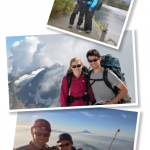Preparation
Discovering state-of-the-art hiking gear was invigorating, and purchasing gear proved far easier than finding an effective internet training program for the hike. San Antonio is only 650 feet above sea level, but I discovered challenging hiking trails in the Texas Hill Country, only 15 miles from home, which nearly simulated hiking the Pyrenees. Progressive training for a minimum of 16 weeks was recommended, with a mix of short and long hikes and dedicated strengthening, so I respectfully started training 24 weeks in advance.
After eight weeks of increasing distances alone and simulating hikes, I developed limiting lumbar pain and metatarsal phalangeal (MTP) swelling. Panic and distress are inadequate words to describe my significant setback at distances of only 11 miles. My anxiety regarding the need to be fit for Camino was overwhelming; I self-referred to a doctor of physical therapy (DPT) for an assessment.
My DPT gently told me that I was not conditioning adequately for uneven and mountainous terrains in Spain. My role as a PT patient was undeniably fruitful. I followed a plan with two months of supervised strengthening of core, pelvic stability muscles and intrinsic muscles of the feet. I also had to abandon heavier hiking shoes for lighter and larger-sized trail shoes, with a wider toe box, for better performance.
An unexpected benefit of the prolonged training time spent alone for hours was an unconsciously created mental space for me away from the hectic universe where my mind could wander almost aimlessly. It was weirdly refreshing, establishing a physical rhythm, in solitude, homing in and out of various thoughts and adventures in my mind without podcasts or music. After watching Emilio Estevez’s 2010 film The Way, starring Martin Sheen, a couple of times and reading Paulo Coelho’s book, The Pilgrimage, I was finally feeling on target for the Camino hike.1,2
Our logistics were organized by Camino Ways—a travel company for Camino hikes that coordinated our flights, lodging in B&Bs and small hotels, with daily breakfast and luggage transfer each morning to our next destination.
We flew into San Sebastian, a beautiful city on the north coast of Spain, not far from the French border and had a wonderful dinner. We were very excited, but apprehensive knowing our first week in the Basque region would demand 20-mile daily hikes in the Pyrenees.





